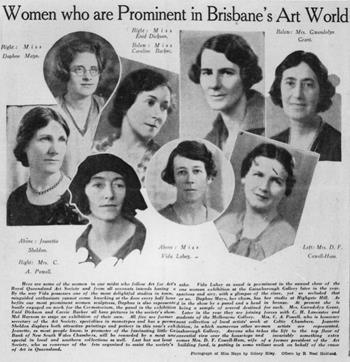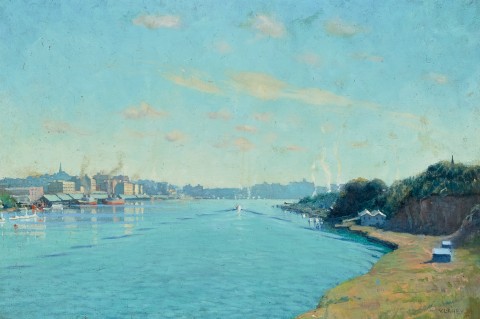EARLY MORNING, BRISBANE RIVER, 1932
VIDA LAHEY
oil on canvas on board
51.5 x 76.5 cm
signed and dated lower right: V. LAHEY 32
The Canberra Gallery, Brisbane
Dr Thomas Montagu Mansfield, Brisbane
Thence by descent
Sally, Lady Croft, Armidale, New South Wales
Thence by descent
Private collection, New South Wales
Exhibition of Paintings by Vida Lahey, Fine Art Society’s Gallery, Melbourne, 19 – 31 October 1932, cat. 2
Vida Lahey: Exhibition of Paintings of Brisbane and of Other Things, Union Trustee Chambers, Brisbane, 20 May – 3 June 1936, cat. 16 (as ‘Early Morning’)
Vida Lahey: Exhibition of Paintings, The Canberra Gallery, Brisbane, 9 – 25 November 1944, cat. 16
Young, B., ‘Great colourist: the art of Miss Vida Lahey’, The Herald, Melbourne, 18 October
1932, p. 1
Herbert, H., ‘A Brisbane Artist’, The Age, Melbourne, 19 October 1932, p. 11
‘Vida Lahey’s Art’, The Brisbane Courier, Brisbane, 22 October 1932, p. 14
‘Vida Lahey’s Art’, The Telegraph, Brisbane, 20 May 1936, p. 7
‘Fine Work in 1-Woman Show’, The Telegraph, Brisbane, 8 November 1944, p. 8
MacAulay, B., Supplement to Songs of Colour. The Art of Vida Lahey, Works Located to 1989, Queensland Art Gallery, Brisbane, 1989, pp. 9, 34, 37, 40
We are grateful to Joanna Bosse, Curator, Bayside Gallery, and her Queensland colleagues for their assistance with this catalogue entry.
Vida Lahey’s exhibition at the Fine Arts Society’s Gallery in Melbourne in 1932 featured seventeen oil paintings, the second largest of which was Early morning, Brisbane River, 1932. It was an immediate hit with the critics. Harold Herbert, writing for The Age, considered the painting to be an oil of ‘high order ... an admirably painted stretch of land and blue water, spacey in conception, and simple yet convincing in treatment.’1 Blamire Young, in his review for The Herald, described Lahey as a ‘great colourist’, and that her evocation of the early morning riverscape was marked by its ‘pure light and the hush of dawn.’2 Arthur Streeton was also an admirer of the ‘fine qualities of light and air’ in her work,3 as was George Bell who considered her to be ‘an artist of consummate taste, an exquisite sense of colour, and a fine sense of composition.’4
210679 Vida Lahey.jpg

Lahey was not only a celebrated artist; she was also a noted author, educator and arts advocate, conferred a Member of the Order of the British Empire (MBE) in 1958 for her services to culture and the arts in Queensland. An early talent, she was awarded first prize for landscape by the Australian Natives’ Association, Brisbane in 1903, before she moved to Melbourne to commence formal studies at the National Gallery Art School in 1905. Two years later, whilst still a student, she won first prize for still life in the landmark First Australian Exhibition of Women’s Work held at the Exhibition Building. However, it was the painting Monday morning, 1912, which really launched her career, a powerful study of two young women labouring in the Lahey family’s household laundry. It entered the collection of the Queensland Art Gallery that same year. The outbreak of war saw her travel to London and at its conclusion, she took classes in Paris in 1919, first at the Académie Calorossi, then with Ethel Carrick Fox; and in St. Ives the following year with New Zealand artist Frances Hodgkins. The 1920s saw further travels through Europe before Lahey settled permanently in Queensland in 1929.
In Early morning, Brisbane River, 1932, the artist captures a sparkling image of an urban river landscape in its heyday. To the right can be seen the old Naval Stores which still stand on the site of a former quarry, the scars of which are evident in the adjacent cliffs. Across the water lies a glimpse of the Brisbane City Botanic Gardens buttressing the former Eagle Street wharves, one of the city’s busiest locations in the 1930s. Characterised by its ‘picturesque personality of salt seas and sailor men’,5 Eagle Street’s row of low sheds marked the locations of Raff’s Wharf, Newton’s Wharf and Barkers Wharf. Presiding over these was a streetscape of multi-storey warehouses once described as being ‘probably, as a group, the best in Brisbane.’6 These architectural symbols of trade and prosperity included Harpers Building (1889); the Mutual Life Association of Australasia (1888); and Parbury’s (1912); with the tallest and newest being the Orient Steam Navigation Company headquarters (1930). Sadly, all were swept away by building booms in the 1960s and early 1980s.
1. Herbert, H., ‘A Brisbane artist: The art of Vida Lahey’, The Age, 19 October 1932, p. 112.
2.Young, B., ‘Great colourist: the art of Miss Vida Lahey’, The Herald, Melbourne, 18 October 1932, p. 13.
3.Streeton, A., ‘Miss Vida Lahey’s art: oils and watercolours. Distinguished flower painting’, Argus, Melbourne, 19 October 1932, p. 54.
4.George Bell. Quoted on catalogue for: Vida Lahey: Exhibition of Paintings of Brisbane and of Other Things, Union Trustee Chambers, Brisbane, 19365.
5.‘Growing City. Romance and Adventure: Street of Adventure’, Courier-Mail, Brisbane, 26 September 1933, p. 126.
6.‘Real Estate. Queensland Trustees: Building extensions’, The Daily Mail, Brisbane, 14 October 1924, p. 14
ANDREW GAYNOR
